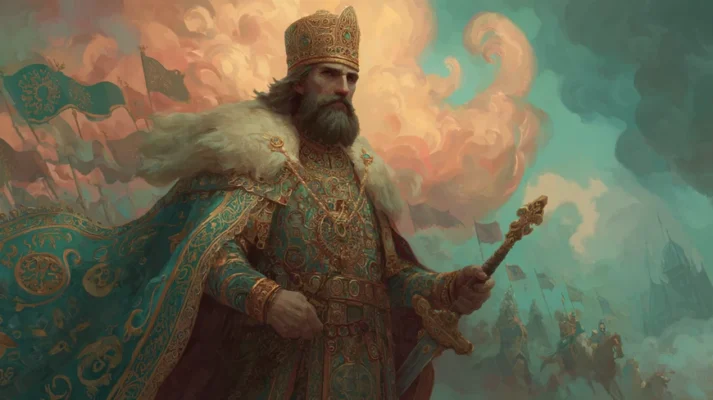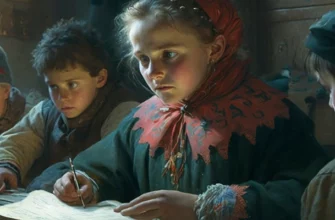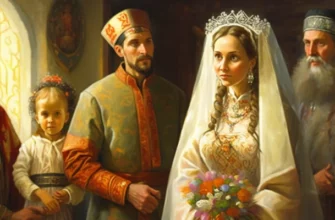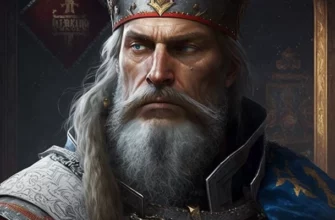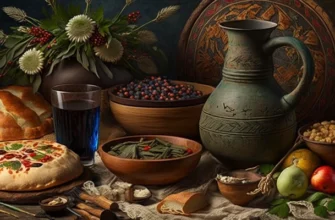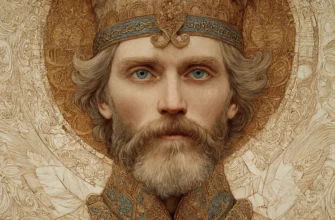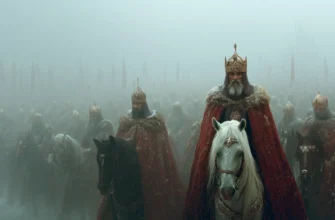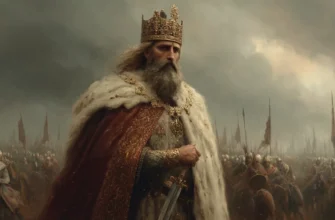Knyaz Volodymyr the Great (c. 958-1015) was a prominent statesman of Kievan Rus, the son of Sviatoslav Ihorovych, grandson of Princess Olha. His reign (980-1015) was a turning point in the history of the state.
At the beginning of his reign, Volodymyr actively strengthened his power, expanded his territories, and introduced pagan reforms in an effort to unite the state religiously. Later, however, he converted to Christianity, following the Byzantine model, was baptized himself, and baptized Rus in 988. This step significantly strengthened the international authority of the state, contributed to the development of writing, culture, and ties with Europe.
In addition to Christianization, Volodymyr carried out important social reforms, founded schools, built churches, and took care of orphans and the poor. For his activities, he was canonized by the Orthodox Church as a saint of the Equal-to-the-Apostles.
Knyaz Volodymyr the Great left a deep mark on the history of Ukraine and became a symbol of spiritual choice and state wisdom.ContentsOrigin and early yearsStruggle for powerThe first years of his ruleDomestic policyDevelopment of cities and tradeMilitary power and border protectionBaptism of RusMass baptism of KyivansForeign policyAlliances and conflictsThe legacy of Vladimir the GreatCanonizationMemory in culture and traditionsConclusionTable of contents
- Origin and early years
- Struggle for power
- The first years of his rule
- Domestic policy
- Development of cities and trade
- Military power and border protection
- Baptism of Rus’
- Mass baptism of Kyivans
- Foreign policy
- Alliances and conflicts
- The legacy of Vladimir the Great
- Canonization
- Memory in culture and traditions
- Conclusion
Origin and early years
Volodymyr the Great was born around 958. He was the illegitimate son of Prince Sviatoslav Ihorovych of Kyiv and Malusha, a keykeeper who, according to legend, came from a noble family. His grandmother, Princess Olha, played an important role in his upbringing.
After Svyatoslav’s death in 972, a power struggle broke out between his sons. Volodymyr received Novgorod, but due to a conflict with his brother Yaropolk, he was forced to flee to Scandinavia. There he enlisted the support of the Varangians and with their help returned to Russia.
In 980, Volodymyr defeated Yaropolk and became the sole ruler of Kievan Rus. His young years were full of political struggle, but they shaped the future wise and strong prince who would later change the course of his country’s history.
Struggle for power
After the death of Prince Sviatoslav Ihorovych in 972, a struggle for power over Kyivan Rus began between his sons Yaropolk, Oleh, and Volodymyr. Yaropolk took Kyiv, Oleg took the land of the Drevlyans, and Volodymyr took Novgorod.
In 977, a conflict broke out between the brothers: Yaropolk killed Oleg during a military confrontation. Upon learning of this, Volodymyr left Novgorod and fled to Scandinavia, where he gathered a Varangian army. In 980, he returned to Russia and waged war on Yaropolk. After a short confrontation, Yaropolk was killed, and Vladimir became the sole ruler of Kievan Rus.
This struggle for power was brutal, but it gave Volodymyr the necessary experience, strength, and determination for future reforms and the unification of the Russian lands.
The first years of his rule
After gaining power in 980, Vladimir the Great focused on strengthening the unity of the state. He began his reign with the reform of paganism by attempting to create a single state pantheon of gods, headed by Perun, to unite the people around a common faith.
Volodymyr also actively expanded the borders of Kievan Rus. He led a series of successful military campaigns against the Jatvians, Poles, Volynians, and other neighboring tribes, which helped to strengthen the state’s borders and central government.
During these years, the prince proved himself to be a prudent ruler and strategist. He built fortifications, appointed local governors, took care of law and order, and tried to streamline the administration of the state. The first years of his reign became the basis for further reforms, including the adoption of Christianity.
Domestic policy
Knyaz Volodymyr the Great’s domestic policy was aimed at strengthening state unity, centralizing power, and developing social life. After his accession to the throne of Kyiv, he began reforms that significantly affected the structure of Kievan Rus.
One of his first attempts was to unify the religious system by creating a pan-Russian pagan pantheon. However, this reform proved ineffective, and later Volodymyr converted to Christianity, which became a key point in his domestic policy. The Christianization of Rus brought a new moral basis, promoted the development of writing, education, and culture.
Volodymyr also strengthened the administrative system: he appointed governors from among his sons to major cities to strengthen the central government. He cared about justice, supported the poor, and founded schools, hospitals, and churches. During his reign, the role of written law and church influence on public life increased.
Thanks to Volodymyr’s domestic policy, Kievan Rus became a stronger and more organized state.
Knyaz Volodymyr the Great carried out a series of administrative reforms aimed at strengthening state power and streamlining the administration of Kievan Rus. One of the key steps was the appointment of his sons and proxies to govern the main cities of the state, such as Novgorod, Polotsk, Turov, and Rostov. This allowed him to control remote regions and reduce the risk of uprisings.
Vladimir also strengthened the system of collecting tribute (tax), improved local governance, and secured trade routes. His policy was centered on strengthening the vertical of power, moving from a tribal system to a more centralized form of government.
During the Christianization of Rus, administrative power was partially intertwined with church power. Volodymyr supported the creation of a church hierarchy, which also contributed to the governability of the state.
Thanks to these reforms, Kievan Rus was transforming into a strong and organized monarchy with a clear system of governance.
Development of cities and trade
During the reign of Volodymyr the Great, Kievan Rus experienced a significant economic and infrastructural boom. One of the prince’s priorities was to develop cities as centers of administrative, religious, and economic life. Kyiv grew into a powerful capital with stone churches, princely palaces, fortifications, and lively marketplaces.
Volodymyr contributed to the development of other cities, such as Pereiaslav, Volodymyr-Volynskyi, Turov, and Novhorod. Churches, schools, and craft workshops were built in the cities, which stimulated the local economy.
International trade gained significant development. Kievan Rus actively traded with Byzantium, the countries of Eastern and Western Europe. Furs, honey, wax, and bread were exported, and fabrics, wine, jewelry, weapons, and luxury goods were imported. The Dnipro remained the main trade artery-the “way from the Varangians to the Greeks” was vital.
Thanks to Volodymyr’s policy, Rus strengthened its economic ties, and cities became centers of cultural and economic development.
Military power and border protection
Knyaz Volodymyr the Great paid considerable attention to strengthening the military power of Kievan Rus and protecting its borders. He organized a powerful army, which included both local soldiers and hired Varangians, experienced fighters from Scandinavia.
Volodymyr conducted numerous military campaigns to defend the state from external enemies, such as the Pechenegs, Yatvyagi, Polish princes, and nomadic tribes. Thanks to these campaigns, he expanded the territory of Rus, established control over important trade routes, and fortified the southern and western borders.
The prince also oversaw the construction of fortifications: castles, fortresses, and ramparts around cities, especially Kyiv. This ensured the security of the state and deterred possible attacks.
The military power and reliable defense of the borders were the basis of the stability of Kievan Rus in the time of Vladimir the Great.
Baptism of Rus’
The Baptism of Rus under Prince Volodymyr the Great was one of the most important events in the history of the state. In 988, Volodymyr converted to Christianity according to the Byzantine model and was baptized in Constantinople. This step was not only religious, but also political: it strengthened ties with the Byzantine Empire and raised the international prestige of Kievan Rus.
After his own baptism, Volodymyr ordered the baptism of the inhabitants of Kyiv and the entire state, which marked the beginning of a massive conversion of the people to the new faith. Christianization contributed to cultural development, the spread of writing, education, and the unity of the state.
The adoption of Christianity by Volodymyr the Great laid the foundation for the spiritual life of Kievan Rus and influenced the formation of its cultural and political identity.
The Christianization of Kievan Rus under Volodymyr the Great had several important reasons. First, the prince sought to strengthen the unity of the state by uniting different tribes and peoples under one religion, which would contribute to stability and centralization of power.
Second, the adoption of Christianity from Byzantium opened up the possibility of establishing strong political and trade ties with the powerful empire, which was important for the security and development of Rus.
Thirdly, the new religion offered moral and ethical standards that helped to strengthen the social system and maintain order in the state.
Finally, Christianization was in line with European trends and helped Kievan Rus integrate into the cultural and political space of medieval Europe.
Mass baptism of Kyivans
After his own baptism, Prince Volodymyr the Great ordered the baptism of the inhabitants of Kyiv and all of Rus’. According to legend, the baptism took place in the Dnipro, a great river that symbolized purification and renewal. This mass rite became a symbol of the adoption of a new faith and the unification of the people.
Not everyone accepted Christianity willingly at first – part of the population was committed to pagan traditions and resisted change. Nevertheless, Volodymyr strongly supported the Christian faith, built churches, and encouraged the clergy.
The mass baptism marked the beginning of a new era for Kievan Rus, contributing to cultural enrichment, strengthening statehood, and deepening ties with the Christian world.
The baptism of Rus provoked a mixed reaction among the population. Many people viewed the new faith with suspicion or even resistance, as pagan traditions were deeply rooted in the life of the people. Some of the elders and priests of pagan cults actively opposed Christianity, fearing a loss of influence.
However, over time, thanks to the support of Prince Volodymyr and his reforms, Christianity became the dominant religion. It brought new moral values, an organized church structure, and education, which gradually changed people’s minds.
Despite the initial difficulties, the adoption of Christianity was an important step toward unifying and strengthening Kievan Rus.
After the adoption of Christianity, the church became a key instrument of state power for Volodymyr the Great. It not only spread the new faith, but also contributed to the centralization of power, the establishment of law and morality in society.
The church was actively involved in education, founding schools that taught literacy, writing, and religious knowledge. It also supported cultural development by creating chronicles, building churches and monasteries.
Thanks to the church, Volodymyr was able to strengthen the state and unite the various peoples and tribes of Kievan Rus under a single spiritual and political center. The church became an important factor in the formation of national identity and cultural heritage.
Foreign policy
The foreign policy of Prince Volodymyr the Great was aimed at strengthening the position of Kievan Rus among neighboring states and expanding its influence. He actively strengthened diplomatic ties, primarily with the Byzantine Empire, which was confirmed by his marriage to the Byzantine princess Anna after his baptism.
Volodymyr also conducted military campaigns to defend the state and expand its borders against the Yatvyagi, Pechenegs, Polish princes, and Vyatichi. His troops controlled important trade routes, which strengthened the economic power of Rus’.
Volodymyr’s diplomacy and military strength contributed to the recognition of Kievan Rus as an important player in the political arena of Eastern Europe, which laid the foundation for the state’s further development.
Alliances and conflicts
Knyaz Volodymyr the Great actively used alliances and military conflicts to strengthen his power and expand the influence of Kievan Rus. He entered into dynastic marriages with the ruling families of neighboring countries, and his marriage to the Byzantine princess Anna became a symbol of a close alliance with Byzantium.
At the same time, Volodymyr fought numerous wars against the Pechenegs, Jatvians, Poles, and other tribes and states to protect his borders and expand his territory. Conflicts with neighbors were often accompanied by both military action and diplomatic negotiations.
By balancing alliances and conflicts, Volodymyr managed to ensure the security of Kievan Rus and increase its role in the international arena.
Knyaz Volodymyr the Great’s ties with the Byzantine Empire were key to the political and cultural development of Kievan Rus. In 988, Volodymyr entered into an alliance with Byzantium, which was strengthened by his marriage to the Byzantine princess Anna, the sister of Emperor Basil II.
This alliance strengthened diplomatic relations and opened access to new technologies, art, and religious ideas. The adoption of Orthodox Christianity based on the Byzantine model was a crucial step in the Christianization of Rus’.
Byzantium was also an important trading partner, and cultural cooperation contributed to the spread of writing, the construction of churches and monasteries in Rus. The ties with Byzantium helped Volodymyr establish Kievan Rus as an influential state on the European stage.
The legacy of Vladimir the Great
Vladimir the Great left behind a huge legacy that determined the further development of Kievan Rus. He united scattered Slavic lands, strengthened centralized power, and laid the foundations of statehood.
His most important achievement was the adoption of Christianity, which not only changed the spiritual life of the people but also opened the door to European culture, education, and diplomacy. Thanks to this reform, Russia became part of the Christian world.
Volodymyr also promoted the development of cities, trade, military power, and administrative structure. His reign laid the foundation for the prosperity of Kievan Rus in the following centuries and remained a symbol of the unity and strength of the state for a long time.
Volodymyr the Great is a key figure in the history of Kievan Rus and Eastern Europe. His reign was marked by the unification of the Slavic lands, the strengthening of centralized power, and the beginning of Christianization, which determined the spiritual and cultural development of the region for centuries.
Vladimir’s adoption of Orthodox Christianity created a solid foundation for the formation of Ukrainian, Belarusian, and Russian cultural traditions. His political and military achievements strengthened the state and ensured its influence among European countries.
Historically, Volodymyr the Great became a symbol of the unification, statehood, and spiritual revival of Kievan Rus.
Canonization
Knyaz Volodymyr the Great was canonized by the Orthodox Church as a saint and equal to the Apostles for his role in the baptism of Kievan Rus. This title emphasizes his importance in the spread of Christianity and the spiritual revival of the people.
Volodymyr’s memory is celebrated on July 15 (28), the day of his death. His canonization was a recognition of the importance of the prince as a spiritual and state leader who laid the foundations of Christian culture in Ukraine and neighboring lands.
Volodymyr the Great left a deep mark on the religious history of the region, and he is revered as a patron saint and symbol of the unity of the Orthodox world.
Memory in culture and traditions
Knyaz Vladimir the Great left a deep mark on the culture and folk memory of Ukrainians, Belarusians, and Russians. His figure is sung in chronicles, folk songs, legends, and works of fiction, where he often appears as a symbol of wisdom, strength, and spiritual rebirth.
Volodymyr is honored by numerous monuments, churches, and holidays, including the main one – St. Volodymyr’s Day, celebrated on July 15 (28). Streets, educational institutions, and cultural institutions are named after him.
The memory of Volodymyr the Great upholds the traditions of Christianity and statehood, reminding us of the importance of unity and national self-determination.
Conclusion
Knyaz Volodymyr the Great is one of the most prominent figures in the history of Kievan Rus. His reign was marked by important reforms, the unification of lands, the strengthening of the state, and the adoption of Christianity, which was a turning point in the spiritual and cultural development of the region.
Volodymyr’s legacy shaped the future development of Eastern Europe, and his role as a state and spiritual leader remains an inspiring example for future generations. His name is forever etched in history as a symbol of unity, strength and faith.
Vladimir the Great was a charismatic and determined leader who knew how to combine military power with diplomacy and religious reform. His wisdom and strategic thinking allowed him not only to unite disparate principalities but also to lay the foundations for a strong centralized state.
Volodymyr initiated the baptism of Rus’, which influenced the spiritual and cultural development of the people, determined their further historical path, and made Kievan Rus’ a part of European civilization. His influence is still felt today as a symbol of statehood, unity and faith.
